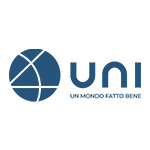ENTE ITALIANO DI UNIFICAZIONE

UNI – Italian Organization for Standardization is a private, non-profit association founded in 1921 appointed by the Italian government ( Italian Law 223/2017) and the European Union (Regulation n.1025/2012 ) to develop, approve and publish technical standards in all economic sectors (industry,
trade and services) except for the electric and electrotechnical ones. UNI is also a meeting point between different stakeholders, such as the business world, research institutions, public administrations, universities, education and training authorities, consumers and societal stakeholders.
UNI has more than 4.000 affiliated among which there are many industrial associations representing large, small, medium and micro enterprises coming from all industrial sectors (with the exception of the electrotechnical one), research institutions, public administrations, universities, consumers associations, Ministries. UNI represents Italy in CEN (European Committee for Standardization) and in ISO (international Standard organisation). In line with what stated in EU Regulation N. 1025/2012, UNI can help to bridge the worlds of standardization and research/innovation by the so-called “Integrated Approach”, a mechanism to ensure standardization is integrated in research and innovation projects with the aim of transferring research results and outcomes of innovation activities into standardization, with long term impacts.
It is important to underline that the development of a standardisation activity is a strategic tool to affect productivity growth, competitiveness, innovation, employment, disseminating the results of the EU Projects. Creating technical specifications, agreements, best practices, guidelines or recommendations, standardisation would serve as a forum for stakeholders to gather requirements and results coming from EU projects, on the basis of a consensus building process.
ROLE IN THE PROJECT:
UNI can provide, based on the project outcomes, different levels of support which can be summarized as follows:
- Elaboration of a standardisation Roadmap to highlight needs or to collect further needs or to draw a strategic Roadmap leading to future standardisation activities (beyond the project scope) with the support of all the actors involved (industry, research, academia, public authorities, etc…).
- Proposing the revision of existing standards in case the research and innovation activities carried out in the project have emphasised that standards in the specific area of interest already exist but it is deemed necessary (through the testing performed in the project) to propose their revision/integration.
- Proposing new standardisation work in case the outcome of the research and innovation activities carried brought to the conclusion that there is a need of developing totally new standardisation deliverables.
